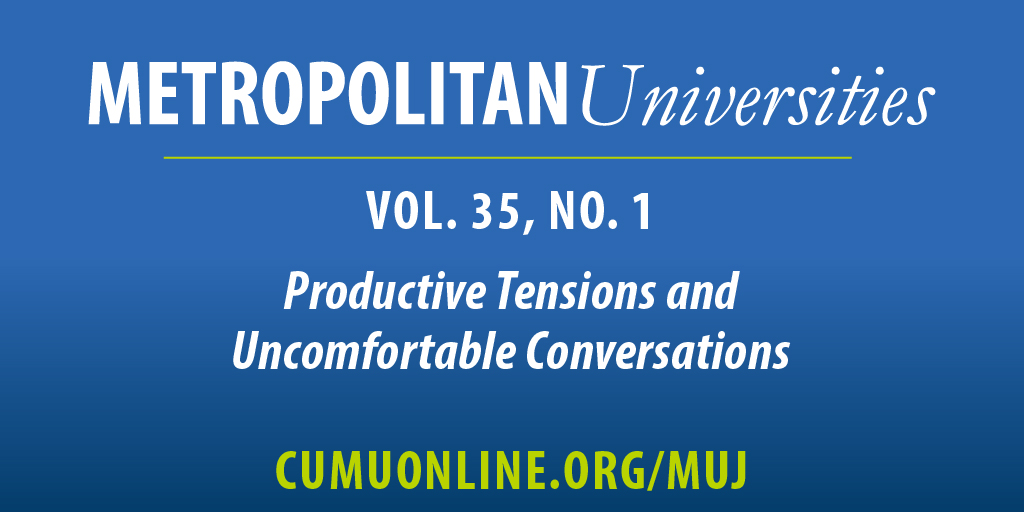Engaging Epistemic Tensions in Graduate Education
Promising Practices and Processes from the Tulane Mellon Graduate Program in Community-Engaged Scholarship
DOI:
https://doi.org/10.18060/27541Keywords:
community engagement, graduate education, community-engaged scholarship, community engaged learning, Community Engaged Learning, epistemic justiceAbstract
Productive tensions with traditional academic practices develop from a graduate certificate program in community engagement at Tulane University. The program offers an alternative approach to graduate education by fostering community, epistemic justice, and care for the whole person through sustained interdisciplinary and transdisciplinary conversations and collaborations. A 2021-22 survey of current and prior program participants in the graduate certificate program documents a variety of tensions that arise when the graduate certificate program is compared to students’ other experiences with graduate school at Tulane.
Analysis relies on theories and concepts of epistemic injustice, decolonizing methodologies and community engagement, which enables interpretation of results. We find that results point to the Tulane Mellon Graduate Program in Community-Engaged Scholarship’s differences in approaches as compared to traditional graduate educational experiences at Tulane, offering insights into more ethical and humane possibilities for graduate education generally as well as particular insights into community-engaged graduate education. These insights would be useful to graduate program directors, graduate students, community-engagement advocates, and administrators interested in connecting their universities to local communities through ethically informed scholarly collaborations.
References
Bonilla-Silva, Eduardo. (2006). Racism without Racists: Color-Blind Racism and the Persistence of Racial Inequality in the United States. Rowman & Littlefield Publishers.
De La Cruz Santana, Lisbeth and Alana Haynes Stein. (2022). Navigating the Joys and Challenges of Public Scholarship in Graduate School. Imagining America Research Report.
Dotson, Kristie. (2014). Conceptualizing Epistemic Oppression. Social Epistemology, vol. 28, no. 2, Apr., pp. 115–38.
Freire, P. (1996). Pedagogy of the oppressed (revised). New York: Continuum, 356, 357-358.
Fricker, Miranda. (2007). Epistemic Injustice: Power and the Ethics of Knowing. Oxford University Press.
la paperson. (2017). A Third University is Possible. University of Minnesota Press.
Merten, Donna M. and Amy T Wilson. (2012). Program Evaluation Theory and Practice: A Comprehensive Guide. 1st ed. Guilford Press.
Mills, Charles W. (1988) Alternative Epistemologies. Social Theory and Practice, vol. 14, no. 3, pp. 237–63.
Mills, Charles W. (1997). The Racial Contract. Cornell University Press.
Mitchell, T. D. (2008). Traditional vs. critical service-learning: Engaging the literature to differentiate two models. Michigan Journal of Community Service Learning, 14(2), 50-65.
Omi, Michael and Howard Winant. (2014). Racial Formation in the United States. 3rd ed., Routledge.
Saltmarsh, John. (2012). Changing Pedagogies. Handbook of Engaged Scholarship, Michigan State University Press.
Smith, Linda Tuhiwai. (1999). Decolonizing Methodologies: Research and Indigenous Peoples. University of Otago Press.
Tuck, E., & Yang, K. W. (2021). Decolonization is not a metaphor. Tabula Rasa, (38), 61-111.
Downloads
Published
Issue
Section
License
Copyright (c) 2024 Lucas Diaz, Ryan McBride, Diana Soto-Olson, Agnieszka Nance

This work is licensed under a Creative Commons Attribution 4.0 International License.



